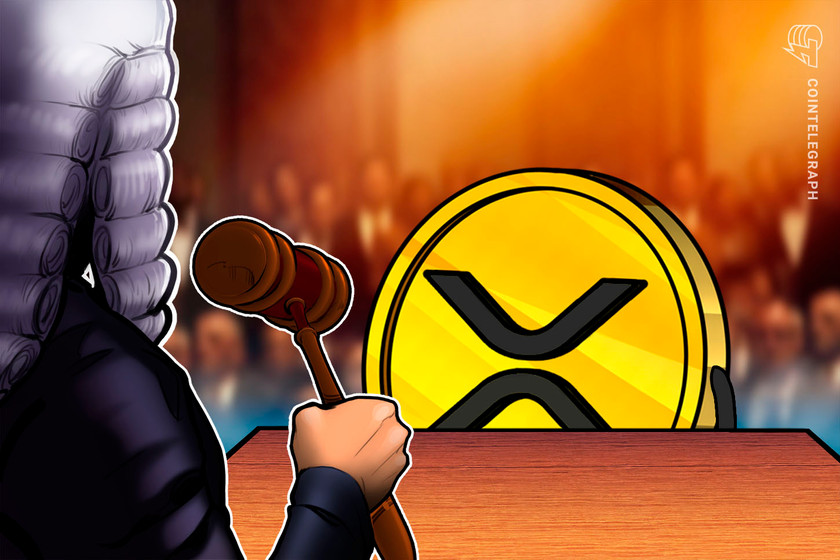
A crypto legal expert says the U.S. Securities and Exchange Commission’s (SEC) decision to appeal a ruling in the Ripple Labs lawsuit is a huge mistake. The SEC first sued Ripple Labs in December 2020, alleging that the firm was selling the crypto asset XRP as an unregistered security. In October 2023, a judge ruled […]
The post Legal Expert Jeremy Hogan Says SEC’s Move To Appeal Ruling in Lawsuit Against Ripple a Big Mistake – Here’s Why appeared first on The Daily Hodl.

An immediate appeal could potentially jeopardize the SEC’s “entire enforcement agenda” if it ends up losing, said Katie Haun of Haun Ventures.
A former federal prosecutor turned chief executive of a crypto-focused venture capital fund says she would be “surprised” if the United States securities regulator lodges an immediate appeal against the Ripple case ruling, as it currently benefits from lack of “legal clarity.”
On July 13, Judge Torres granted a partial summary judgment in favor of Ripple Labs regarding XRP’s status as a security. At the time, a few commentators warned that an appeal from the SEC would be a possibility.
However, in a July 15 Twitter thread, Haun Ventures CEO Katie Haun explained that the securities regulator will likely stay quiet as it benefits from the “current confusion” and that losing an appeal could jeopardize its future enforcement actions.
Some non-legal advice musings on the Ripple decision, including two main takeaways:
— Kathryn Haun (@katie_haun) July 15, 2023
1/ The Court drew a reasonable line and overall it's a good outcome for the industry. For other suits w/ the SEC, we believe the Supreme Court’s “major questions doctrine” will play a larger…
“Anything is possible, but an immediate appeal seems unlikely both because the agency would have to ask the court to split this decision from the portion going to trial and because I’m skeptical the SEC actually wants legal clarity,” said Haun.
“The Commission benefits from the current confusion and losing these issues on appeal would jeopardize its entire enforcement agenda. So I’d be surprised if the SEC tried to appeal now.”
Haun is but the latest commentator to share the view.
On July 15, Ripple Labs CEO Brad Garlinghouse also believes it may “take years” before the SEC lodges an appeal. He added that an appeal by the SEC would only reinforce Judge Torres’ decision that XRP is not a security.
In a video posted on YouTube on the same day, U.S. lawyer and Ripple commentator Jeremy Hogan said he believes the SEC will launch an appeal after the trial between SEC and Ripple ends, which is scheduled for early 2024.
The SEC is currently suing crypto exchanges Binance and Coinbase over alleged violations of securities laws. Some believe the recent Ripple case ruling, while not a binding precedent, could have an impact on the outcome of the cases.
Related: Ripple decision is 'troublesome on multiple fronts', says former SEC official
Meanwhile, many crypto commentators and lawmakers have called for Congress to take action and give legal clarity to crypto in light of the recent ruling.
Brian Quintenz, former commissioner of the Commodity Futures Trading Commission — now head of policy for venture capital fund a16z crypto — stated that the recent Ripple court ruling “only results in more uncertainty for entrepreneurs and builders.”
U.S. Senator Cynthia Lummis said the ruling underscores the urgent need for Congress to establish a clear and comprehensive regulatory framework for the cryptocurrency industry.
Magazine: Crypto regulation: Does SEC Chair Gary Gensler have the final say?

In January, lawyer John Deaton persuaded the Judge in the SEC vs LBRY case that secondary LBC token sales don’t constitute a securities offering.
Ripple may be holding its breath a bit longer after a United States District Judge refused to rule on if the secondary sale of LBRY Credits (LBC) constitutes a security.
On July 11, New Hampshire District Court Judge Paul Barbadoro made the ruling in the case the United States Securities and Exchange Commission (SEC) brought against the decentralized content platform LBRY.
The ruling may have offered legal precedent to fellow District Court Judge Analisa Torres, who is set to make a decision on the SEC’s case against Ripple in the coming months.
In his ruling, Judge Barbadoro said:
“Accordingly, I take no position on whether the registration requirement applies to secondary market offerings of LBC.”
A secondary market is where traders buy and sell securities, while a primary market involves trading from the company issuing the security directly.
John Deaton, a U.S. lawyer representing thousands of XRP (XRP) token holders, tweeted on July 11 that he contacted Judge Barbadoro to seek clarity on if LBC constituted a security.
Judge Barabadoro ultimately decided to uphold his “judicial restraint,” Deaton said.
I asked the Judge to clarify that the token itself is not the security just as Judge Castel did in Telegram. He declined to do so because he said that specific issue wasn’t litigated and he believes in exercising judicial restraint. He wrote: “it suffices to say that merely… https://t.co/xR9AemS5Hq
— John E Deaton (@JohnEDeaton1) July 11, 2023
Judge Barbadoro’s latest opinion is an about-turn from what he concluded in a January appeal hearing where Deaton persuaded him that the secondary sale of LBC doesn’t constitute a securities offering.
The New Hampshire Judge clarified in the appeal hearing that LBC is only considered a security when the sale is made directly.
The SEC also admitted that secondary market LBC sales don’t constitute a security.
While the SEC won a summary judgment in November 2022, it elected to settle for $22 million at an appeal hearing on Jan. 30.
In May, the SEC revised the figure and instead asked the court to impose a fine of $111,000 citing LBRY’s “lack of funds and near-defunct status.”
Related: The aftermath of LBRY: Consequences of crypto’s ongoing regulatory process
Meanwhile, Jeremy Hogan, a U.S.-based Attorney and Ripple advocate, told Cointelegraph that District Court Judge Analisa Torres will likely lay out her ruling within the next couple of months.
“We'll have the big picture sometime in the next two months and, unless Ripple completely wins, we'll know the details before the end of the year. If the details are bad then we will see appeals that will drag on for a long time.”
“But [that] won't really matter for a typical XRP holder,” he added.
The final ruling is out in the SEC v. LBRY case.
— Jeremy Hogan (@attorneyjeremy1) July 11, 2023
The Judge did not rule on secondary sales (or, not surprisingly, the Major Questions Doctrine). He enjoined further violations and issued a penalty.
Is a similar result possible in the Ripple case? https://t.co/6bOl34UKpo
Magazine: Crypto Twitter Hall of Flame: Pro-XRP lawyer John Deaton ‘10x more into BTC, 4x more into ETH

One crypto legal expert says the U.S. Securities and Exchange Commission (SEC) has not proven that XRP is a security in the regulator’s lawsuit against Ripple Labs. In a lengthy thread, attorney and XRP supporter Jeremy Hogan tells his 263,300 Twitter followers why he believes the SEC has so far failed to prove XRP is a security. […]
The post The SEC Has Failed To Prove XRP Is a Security in Ripple Lawsuit, Says Attorney Jeremy Hogan appeared first on The Daily Hodl.

Lawyer Jeremy Hogan believes the United States Securites and Exchange Commission has failed to legally demonstrate that XRP is a security.
Ripple’s XRP (XRP) is not a security because it does not fit the definition of an “investment contract,” the “only” legislative definition that it could “possibly” fit, according to Jeremy Hogan, a partner at the law firm of Hogan & Hogan.
In a series of tweets on April 9, Hogan explained that, in his opinion, XRP could only be considered a security under the definition of an "investment contract," as it doesn't fit the other definitions of a security such as stocks or bonds.
Hogan argues, however, that the United States Securities and Exchange Commission has not demonstrated an implied or explicit investment contract in its suit against Ripple.
The #1 reason why XRP is not a Security (a thread).
— Jeremy Hogan (@attorneyjeremy1) April 9, 2023
First, under the legislative definition of a security, XRP can only POSSIBLY fit under the definition of an "investment contract." It is not a stock or bond, etc..
Even the SEC concedes this: "investment contract." pic.twitter.com/n9g7ZEos2n
"Instead it argues that the purchase agreement is all that is required — and that is all it proves," Hogan stated.
"But that argument tears the 'investment' from the 'contract' as a simple purchase, without more, [there] cannot be an 'investment contract,' it is just an investment (like buying an ounce of gold) as there is no obligation for Ripple to do anything except transfer the asset," he added.
The SEC initiated a lawsuit in December 2020, claiming that Ripple illegally sold its XRP token as an unregistered security.
Ripple has long disputed the claim, arguing that it doesn't constitute an investment contract under the Howey test — a legal test used to determine if a transaction qualifies as an investment contract. It was established in 1946 by the U.S. Supreme Court in the SEC v. W.J. case.
Hogan further argues that all of the "blue sky" cases, which the Howey case relies on for defining an "investment contract," involved some form of a contract regarding the investment.
Related: Ripple CEO: XRP lawsuit resolved by June, SEC conduct ‘embarrassing’
"Indeed, how can a person 'reasonably rely' on an offeror to make them a profit when they have zero legal recourse when that offeror fails to come through?" he said.
"They cannot. Even the oft-quoted four-part test implies that a ‘contract’ of some sort is required."
Hogan says the crux of the issue is not whether Ripple used money from the sale of XRP to fund its business, but if the SEC has proven that there was either an implied or explicit "contract" between Ripple and XRP purchasers relating to their "investment."
"There was no such contract," Hogan claimed.
Magazine: Bitcoin in Senegal: Why is this African country using BTC?

The former FTX CEO has offered multiple apologies and admitted failings at least a dozen times during the one-hour interview.
Former FTX CEO Sam Bankman-Fried apologized or admitted failure at least 12 times during his appearance at the New York Times' DealBook Summit on Nov. 30.
In a wide-ranging video interview, Bankman-Fried was asked to answer a number of questions surrounding the downfall of the now-defunct exchange, with some even suggesting that some of his statements could be used to incriminate him in legal proceedings.
In a Nov. 30 Twitter post, crypto attorney Jeremy Hogan, Partner at Hogan & Hogan said that the “light cross-examination” of Bankman-Fried at the DealBook Summit has already returned “at least 3 incriminating statements so far.”
SBF is getting a light cross-examination at the NYT/Dealbook Summit and has made at least 3 incriminating statements so far.
— Jeremy Hogan (@attorneyjeremy1) November 30, 2022
Why are his lawyers (or parents) letting him do this?? pic.twitter.com/Nd0poutAA0
Alan Rosca from the law firm Rosca Scarlato said it was “pretty astonishing that he’s in effect testifying at the DealBook summit. Hard to think of a precedent for this.”
Bankman-Fried’s first concession came while greeting interviewer Andrew Sorkin, when he said in reference to the collapse of FTX:
“Clearly, I made a lot of mistakes or things I would give anything to be able to do over again.”
An apology came moments later when Sorkin confronted him with a letter written by an FTX customer who lost $2 million in life savings after the exchange collapsed.
“I'm deeply sorry about what happened,” said Bankman-Fried in response to the customer's story.

Later, when discussing the allegations that Alameda used FTX client funds to cover loans, Bankman-Fried said that while he “didn't know exactly what was going on” at Alameda,” he concedes it was still his duty as FTX CEO to “make sure I was doing diligence.”
“A lot of these are things that I've learned over the last month that I learned [...] I mark that as a pretty big oversight that I wasn't more aware of,” he said.
Bankman-Fried admitted failure again when quizzed about FTXs former standing in the industry and the loss of trust in crypto now that the exchange has collapsed, stating: “I mean, like, look, I screwed up.”
“I was CEO, I was the CEO of FTX. And I mean I say this again and again, that that means I had a responsibility that means that I was responsible ultimately for doing the right things and I mean, we didn't. Like, we messed up big.”
He continued to concede FTX’s failings, stating “there absolutely were management failures” oversight failures, and transparency failures.
Toward the end of the interview, Sorkin directly asked Bankman-Fried whether he had been truthful with the audience and whether he agreed that there had been times that he had lied.
Bankman-Fried said he wasn’t aware of any times that he lied, but explained that there were times when asking as a representative or “marketer” for FTX, that he would paint FTX “as compelling [...] as possible.”
“I wasn’t talking about what are the risks involved with FTX […] I obviously wish that I spent more time dwelling on the downsides and less time thinking about the upsides.
Related: ‘I never opened the code for FTX:’ SBF has long, candid talk with vlogger
Bankman Fried was asked what his lawyers are telling him at the moment, and whether it was a good idea for him to be speaking publicly. He answered “very much not.”
“I mean, you know, the classic advice, don’t say anything [...] recede into a hole.”
Bankman-Fried said he believes he has a duty to talk to people and explain what happened and to “try and do what’s right.”
"I don't see what good is accomplished by me just sitting locked in a room pretending the outside world doesn't exist," he explained.
While the interview appeared to cover a number of confronting issues for Bankman-Fried, some in the community still believe that the questions were not challenging enough, nor was there an adequate follow-up to some of the hard-hitting questions.
A Twitter poll launched by a self-proclaimed crypto trader “Cantering Clark” found that more than half of the 1,119 respondents believed Sorkin “Soft-balled” the interview with Bankman-Fried.

Ripple argued that XRP profits came from “market forces of supply and demand” rather than any contract between Ripple and XRP token holders.
The U.S. Securities and Exchange Commission (SEC) and Ripple Labs have both called for a federal judge to make an immediate ruling on whether Ripple’s XRP sales violated U.S. securities laws.
In separate motions filed on Sept. 17 by Ripple and the SEC, both have called for a summary judgment in the U.S. District Court Southern District of New York.
Summary judgments are submitted to the courts when a party involved believes there’s enough evidence at hand to make a ruling without the need to proceed to trial.
Both parties have called on Judge Analisa Torres to make an immediate ruling as to whether Ripple’s XRP sales violated U.S. securities laws. Ripple has argued that the SEC has run out of answers to prove XRP sales constituted an “investment contract," while the SEC has held strong on its beliefs that it does.
Ripple CEO Brad Garlinghouse in a Twitter post on Sept. 17 said the filings made it clear that the SEC “isn’t interested in applying the law.”
“They want to remake it all in an impermissible effort to expand their jurisdiction far beyond the authority granted to them by Congress,” he said.
Today's filings make it clear the SEC isn’t interested in applying the law. They want to remake it all in an impermissible effort to expand their jurisdiction far beyond the authority granted to them by Congress. https://t.co/ooPPle3QjI
— Brad Garlinghouse (@bgarlinghouse) September 17, 2022
Meanwhile, Ripple general counsel Stuart Alderoty noted that “after two years of litigation” the SEC is “unable to identify any contract for investment” and “cannot satisfy a single prong of the Supreme Court Howey test.”
In its motion for summary judgment, Ripple claimed that the SEC’s case “boils down to an impermissibly open-ended assertion of jurisdiction over any transfer of an asset."
The motion also argued that the SEC cannot establish that XRP token holders could not “reasonably expect profits” based on Ripple’s efforts as there were no contract obligations between Ripple and XRP token holders.
On the other hand, the SEC’s own motion for summary judgment argued that there can be an “investment contract” without a contract, any rights granted to the purchaser, and without any obligations to the issuer.
But Ripple argued in its motion “that is not and should not be the law, because without these essential features there is nothing to which the Howey test can sensibly be applied.”
Related: The SEC vs. Ripple lawsuit: Everything you need to know
Ripple instead pointed to profits coming from “market forces of supply and demand,” something that the SEC “conceded” according to the Ripple motion.
The significance of this admission was highlighted by U.S. Attorney Jeremy Hogan in a Sept. 17 post on Twitter, stating that “these concessions are perfect for a summary judgment.”
The filing of the Ripple and SEC motions brought about mostly positive sentiment from the XRP community, with one Twitter user believing “the end is near”:
The end is near….Better make sure those bags are packed!!! #XRPArmy #xrpthestandard #Tothemoon https://t.co/9aUEex67V0
— Paul Macrae (@PaulMac_1975) September 18, 2022
The motion for summary judgment comes nearly two years after the SEC sued Ripple, former CEO Christian Larsen and current CEO Brad Garlinghouse in Dec. 2020 for allegedly raising $1.3 billion through unregistered securities sales through XRP.
If the court executes the summary judgment, the court ruling will have a profound impact on determining which cryptocurrencies constitute a security under U.S. securities laws.
The XRP token rose to highs not seen since July following the motion filing — reaching nearly $0.40, but has fallen slightly since then and is currently priced at $0.34, according to CoinGecko.

A legal expert who is closely following the U.S. Securities and Exchange’s (SEC) crypto case against Ripple says the window for a potential settlement has arrived. Attorney Jeremy Hogan, an XRP proponent and US legal counsel, says the SEC’s allegations that Ripple sold XRP as an unregistered security could be resolved as early as this […]
The post Crypto Legal Expert Says XRP Settlement Between SEC and Ripple Could Be Imminent appeared first on The Daily Hodl.

A crypto legal expert says that the Judge in the U.S. Securities and Exchange Commission’s (SEC) case against Ripple Labs is losing patience with the regulatory agency for flip-flopping on its story. In a new video update, attorney Jeremy Hogan, who has been closely following the case, says that Judge Sarah Netburn is getting tired […]
The post Judge Losing Patience in Ripple and XRP Lawsuit As SEC Changes Its Story Too Many Times: Crypto Legal Expert appeared first on The Daily Hodl.

The U.S. Securities and Exchange Commission (SEC) is losing a prominent argument in its lawsuit against Ripple Labs. Federal Judge Sarah Netburn denied the SEC’s attempt to not provide internal documents relating to former SEC Director William Hinman, who made a speech in 2018 stating that Ethereum (ETH) was not a security. Netburn first ordered […]
The post Ripple Wins Latest Legal Round To Compel SEC To Produce Evidence in XRP Lawsuit appeared first on The Daily Hodl.